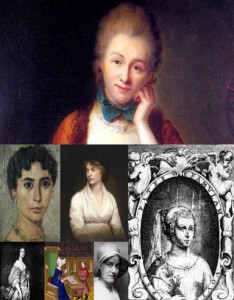
Women have been philosophers for over 2,500 years–they’re just now getting the credit they’re due. Image courtesy International Association of Women Philosophers.
I studied philosophy in high school, reading books such as¬†Jostein Gaarder’s¬†Sophie‚Äôs World. I don‚Äôt recall ever hearing about a female philosopher. Even in my advanced history courses, there weren‚Äôt a lot of women thinkers ‚Äì except Hypatia of Alexandria, who was a¬†mathematician, astronomer, and philosopher, as well as the head of the Neoplatonic school at Alexandria.
Project Vox aims to change that by becoming a ‚Äúvirtual hub‚Äù for researching and acknowledging the part that early modern women played in the development of modern philosophy. The goal is “to recover the lost voices of women who have been ignored in standard narratives of the history of modern philosophy.”
But…how many women philosophers were there? Are there really enough to dedicate an entire project to only the Early Modern period (from about 1600 to 1800)?
Project Vox starts with four:
- Margaret Cavendish (1623 – 1673) published over a dozen original works and debated natural philosophy without ever having formal education.
- Anne Conway (1631 – 1679) led a private life but her works became very influential on her male colleagues, such as Francis Mercury Van Helmont and Henry More.
- Lady Masham (1659 – 1708) was well known for her friendship with John Locke. She anonymously published two treatises on moral philosophy, metaphysics, and the education of women and engaged in the “Republic of Letters” on the European continent with other philosophers.
- Emilie Du Chatelet (1706 – 1749), perhaps one of the more well-known female philosophers, produced famous translations and wrote a number of her own philosophical essays, including Foundations of Physics (1740) that was republished and translated into several languages within only two years.
These are some great names to start with – but only four? A quick Google search yields that there’s a lot more to add. There’s Marie de Gournay who advocated for women’s education, and Princess Elisabeth of Bohemia, who exchanged letters with Rene Descartes and became one of his fiercest critics.
The time frame is also limiting, excluding women such as Anna Julia Cooper, an African-American who published the philosophical “A Voice from the South by a Black Woman of the South” in 1892.
Despite this, I look forward to seeing Project Vox expand and hope they’ll begin to include lesser-known female voices in philosophy. It may be a small step, but it’s in the right direction.
-Tiffany Rhoades
Program Developer
Girl Museum Inc.
